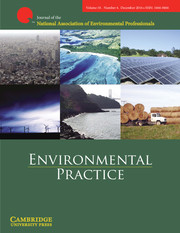No CrossRef data available.
Article contents
ENVIRONMENTAL REVIEWS AND CASE STUDIES: Transfer or not Transfer? It is a Question: The Challenges to and Solutions for the Transfer Procedure of Suspected Environmental Pollution Criminal Cases
Published online by Cambridge University Press: 25 October 2013
Abstract
Serious environmental pollution incidents happen in China every year. However, only a few of them have been filed as environmental pollution criminal cases. We argue in this paper that the main reason is because the environmental administrative agencies often refuse to transfer the suspected environmental pollution criminal cases to the judicial authorities. Therefore, it's critical to better supervise the transfer of cases from the environmental administrative agencies, in order to ensure the implementation of the criminal laws and regulations, as well as to pressing criminal charges on the suspects instead of having them get away with administrative penalties. The supervision mechanisms include at least the interior supervision by other administrative agencies and the exterior supervision by the general public. An effectively functioning environmental criminal law system is very important for environmental protection and rule of law in China.
Environmental Practice 15:271–279 (2013)
- Type
- Features
- Information
- Copyright
- Copyright © National Association of Environmental Professionals 2013




